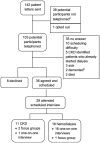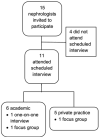Discussions of the kidney disease trajectory by elderly patients and nephrologists: a qualitative study
- PMID: 22221483
- PMCID: PMC3626427
- DOI: 10.1053/j.ajkd.2011.11.023
Discussions of the kidney disease trajectory by elderly patients and nephrologists: a qualitative study
Abstract
Background: Elderly patients with advanced kidney disease experience considerable disability, morbidity, and mortality. Little is known about the impact of physician-patient interactions on patient preparation for the illness trajectory. We sought to describe how nephrologists and older patients discuss and understand the prognosis and course of kidney disease leading to renal replacement therapy.
Methods: We conducted focus groups and interviews with 11 nephrologists and 29 patients older than 65 years with advanced chronic kidney disease or receiving hemodialysis. Interviews were audiorecorded and transcribed. We used qualitative analytic methods to identify common and recurrent themes related to the primary research question.
Results: We identified 6 themes that describe how the kidney disease trajectory is discussed and understood: (1) patients are shocked by their diagnosis, (2) patients are uncertain how their disease will progress, (3) patients lack preparation for living with dialysis, (4) nephrologists struggle to explain illness complexity, (5) nephrologists manage a disease over which they have little control, and (6) nephrologists tend to avoid discussions of the future. Patients and nephrologists acknowledged that prognosis discussions are rare. Patients tended to cope with thoughts of the future through avoidance by focusing on their present clinical status. Nephrologists reported uncertainty and concern for evoking negative reactions as barriers to these conversations.
Conclusions: Patients and nephrologists face challenges in understanding and preparing for the kidney disease trajectory. Communication interventions that acknowledge the role of patient emotion and address uncertainty may improve how nephrologists discuss disease trajectory with patients and thereby enhance their understanding and preparation for the future.
Copyright © 2012 National Kidney Foundation, Inc. All rights reserved.
Figures



Comment in
-
On being better kidney doctors: understanding trajectories, probabilities, predictability, and people.Am J Kidney Dis. 2012 Apr;59(4):475-7. doi: 10.1053/j.ajkd.2012.01.008. Am J Kidney Dis. 2012. PMID: 22444489 No abstract available.
References
-
- US Renal Data System. USRDS 2010 Annual Data Report: Atlas of Chronic Kidney Disease and End-Stage Renal Disease in the United States. Bethesda, MD: National Institutes of Health, National Institute of Diabetes and Digestive and Kidney Diseases; 2010.
-
- Kurella M, Covinsky KE, Collins AJ, Chertow GM. Octogenarians and nonagenarians starting dialysis in the United States. Ann Intern Med. 2007;146(3):177–183. - PubMed
-
- Lunney JR, Lynn J, Foley DJ, Lipson S, Guralnik JM. Patterns of functional decline at the end of life. JAMA. 2003;289(18):2387–2392. - PubMed
-
- Cukor D, Cohen SD, Peterson RA, Kimmel PL. Psychosocial aspects of chronic disease: ESRD as a paradigmatic illness. J Am Soc Nephrol. 2007;18(12):3042–3055. - PubMed
Publication types
MeSH terms
Grants and funding
LinkOut - more resources
Full Text Sources
Medical

